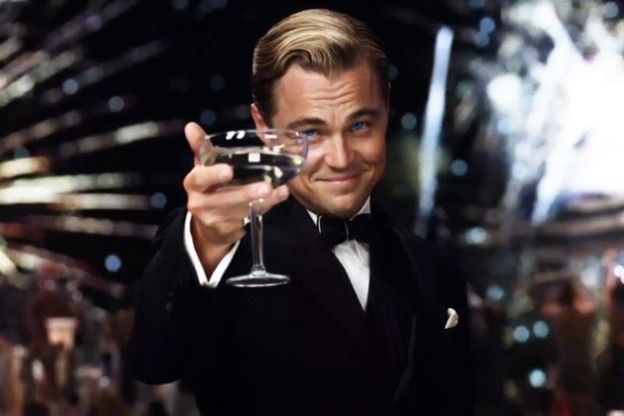I wanted to love the Great Gatsby adaptation so much. I tried, I really did. But when a studio moves a prominent release from prime Oscar season to the following summer, that’s usually a bad sign for the movie’s prospects. And in this case, smoke meant fire.

This is my world, and you’re all just living in it.
Fitzgerald’s Great American Novel is set in the 1920s and follows the hopes and dreams of nouveau-riche Long Islander Jay Gatsby (Leonardo DiCaprio). Gatsby, initially a shadowy and mysterious figure, owns a mansion from which he throws the most inclusive and ornate parties in New York. Of course, Gatsby—who really tried to ruin courtship for all future generations of guys—is doing everything for the love of one woman: the flighty, eminently-susceptible Daisy Buchanan (Carey Mulligan). That Daisy’s voice “is full of money” doesn’t seem to register as a negative to Gatsby, nor does her marriage to the old-money, uber-snobby Tom Buchanan (Joel Edgerton).
Narrating the story from a safe distance is Daisy’s cousin, the eternally bland Tobey Maguire (uh, I mean Nick Carraway) but outlandish director Baz Luhrmann (Moulin Rouge, Romeo + Juliet) tries his hardest to eradicate blandness. As is his wont, he jazzes up this elegiac story with decidedly non-elegiac trappings. Gatsby’s predilection for parties conveniently allows Luhrmann to drench the screen with fireworks, confetti attacks, songs, dance numbers, and beautiful people enjoying themselves so excessively. As the trailers promise, the first hour is a heady rush of sights and sounds, more to be experienced than appreciated on any sort of intellectual level.
It often feels as though the movie intentionally adopts a fantastical tone in order to indulge Gatsby’s dreams (think of the “Is all of this made entirely from your own imagination?” line). Yet Luhrmann’s style (well-known to moviegoers by this point) is still an odd fit for this story. The soundtrack, visual flourishes, misguided story additions, and emotional emptiness give him away: he’s more interested in the razzle-dazzle than in the lyrical, melancholic beauty at the core of Fitzgerald’s book. As Wesley Morris put it, “Luhrmann’s not interpreting the book – or he’s not interpreting it far enough.”
Too many scenes in the movie’s latter half, after the parties have mostly been extinguished, fail to resonate on any sort of emotional level. Some of that may be due to the difficulty of adapting this particular yarn, which excels more on the strength of its prose than plot. (For example, much of the action leading up to the fateful car crash feels stilted and convoluted.) Fitzgerald managed to write in a sparse, readable style that was simultaneously fiercely evocative. We still read him because of lines like “As we passed over the dark bridge, her wan face fell lazily against my coat’s shoulder and the formidable stroke of thirty died away with the reassuring pressure of her hand.” The tension between the effortless, rhythmic flow of the narration, which compels your eyes quickly down the page, and the wrenching descriptions that force you to stop and think, befits a masterpiece.
The final few paragraphs are so good, they’ll bring a tear to your eye if you’re not careful. This is writing of the highest caliber, and because of his gifts, Fitzgerald was able to get away with more sentimentality than most high-level literature allows. The last sentence is rightfully famous, but I’ve always been partial to Nick’s observation from a moment earlier, as he stares out over the sound outside Gatsby’s house: “…for a transitory enchanted moment man must have held his breath in the presence of this continent, compelled into an aesthetic contemplation he neither understood nor desired, face to face for the last time in history with something commensurate to his capacity for wonder.”
This is far above any level that Luhrmann can handle. He wastes time, takes you out of the story, and needlessly modifies character by placing Nick in a sanatorium, where he battles alcoholism and ‘writes’ the novel. And he struggles to find his way during the midsection that’s almost entirely devoid of conflict. (Keeping this relatively brief story under two and a half hours would have been a good first start.) This is where you yearn for someone else behind the wheel; movies have to work harder than novels to get away with conflict-free stretches.
Some of the supporting characters in the novel have always felt a little underdeveloped to me, and the casting decisions here are equally hit-and-miss. Carey Mulligan was a solid choice to play the devilishly tricky role of Daisy; she has to constantly balance between sophistication and emptiness, and I largely bought her, even if she conveys the former a little better than the latter. Maguire, perhaps cast because of his friendship with DiCaprio, is predictably weak. (He’s too old now, but a young Matt Damon would have been great for the role.) Edgerton does a fine, if unremarkable, job as Tom.
But Luhrmann did have one big advantage here: DiCaprio is a freakishly perfect fit for Gatsby. All of the man’s flaws, hopes, and dreams are an encapsulation of the kind of characters he likes playing anyway. His first reconciliation with Daisy after those five years is well-handled, affording Leo the chance to be his most vulnerable, most relatable. The movie also does right by Nick’s unforgettable goodbye to him, that “You’re worth the whole damn bunch put together” line that represented the only compliment he ever gave him. And that smile. Oh, that smile. I’ve heard people say there was applause in the theater when Leo first comes on screen.
That fact says more about this movie than you realize. How often does a movie get applause right in the middle of it? You can credit Luhrmann for crafting such an indelible image, but if the high point of your movie comes an hour into it, you haven’t stretched yourself far enough.

